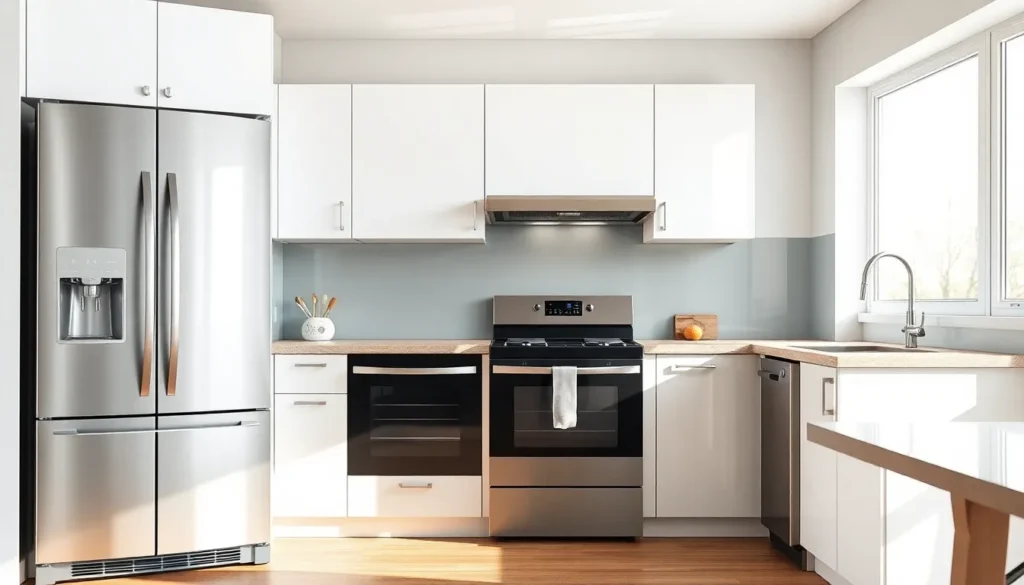Imagine waking up to the gentle hum of your coffee maker, the blinds slowly rising to let in the morning sun, and your favorite playlist serenading you as you start the day. Welcome to the world of modern smart homes, where technology isn’t just a convenience; it’s a lifestyle. These homes are like having a personal assistant who never sleeps—always ready to make life a little easier and a lot more fun.
Table of Contents
ToggleOverview Of Modern Smart Homes
Modern smart homes integrate various technologies to enhance convenience, security, and energy efficiency. Smart speakers, like Amazon Echo and Google Nest, act as central hubs, allowing users to control devices through voice commands. Security cameras and smart locks add layers of protection, enabling homeowners to monitor activity in real time.
Smart lighting systems respond to individual preferences, adjusting brightness and color according to mood or time of day. Thermostats such as Nest optimize energy usage, learning the homeowner’s schedule to reduce wastage while maintaining comfort. Homeowners appreciate the ability to control heating and cooling systems remotely via mobile apps.
Entertainment systems also benefit from smart technology. Streaming services can sync with smart TVs, providing seamless access to content. Multi-room audio systems allow users to play music throughout the home, catering to different tastes in each space.
Energy management plays a significant role in modern smart homes. Solar panels can work in conjunction with smart devices, optimizing energy consumption. Data collected from energy usage can lead to cost savings, encouraging homeowners to adopt greener practices.
Interconnectivity remains a cornerstone of modern smart homes. Devices communicate with each other through systems like IoT (Internet of Things), creating a cohesive living environment. Customization options allow homeowners to tailor settings to their needs, ensuring a personalized experience.
Healthcare monitoring has emerged as another benefit. Wearables can alert users to health issues and connect with smart home systems to provide assistance. This feature is particularly valuable for elderly residents, promoting independent living while ensuring safety.
All these factors contribute to the allure of modern smart homes, positioning them as a significant advancement in residential living.
Key Features Of Modern Smart Homes

Modern smart homes utilize advanced technology to enhance comfort, convenience, and efficiency. Key features make everyday living more enjoyable and secure.
Home Automation Systems
Home automation systems streamline daily routines by integrating various devices. Smart hubs, like Amazon Echo and Google Nest, control lights, thermostats, and security systems using voice commands. Homeowners can customize settings for specific times, ensuring that their homes adjust automatically. Scheduling features allow lights to turn on at dusk or thermostats to adjust before arriving home. Compatibility with numerous devices makes it easy to expand or modify a smart home system over time.
Smart Appliances
Smart appliances offer advanced functionality that enhances everyday tasks. Refrigerators with touch screens provide recipe suggestions and grocery lists while monitoring food inventory. Washing machines allow remote control and monitoring via smartphone apps, making laundry more efficient. Dishwashers integrate sensors to optimize water and energy use, resulting in lower utility bills. Each appliance contributes to a seamless experience that saves time and energy, contributing to the overall appeal of modern smart homes.
Energy Management Solutions
Energy management solutions play a crucial role in minimizing energy consumption. Smart thermostats, such as Nest, learn user preferences and adjust heating and cooling accordingly. Solar panels combined with battery storage store energy for later use, promoting sustainability. Real-time energy monitoring systems track usage patterns, allowing homeowners to identify opportunities for savings. Automatic shutoff features in lights and outlets prevent energy waste, enhancing the home’s overall efficiency.
Benefits Of Modern Smart Homes
Modern smart homes offer significant advantages that reshape how residents experience daily life. Enhanced security, increased convenience, and improved energy efficiency stand out as key benefits.
Enhanced Security
Smart homes incorporate advanced security features to protect residents. Security cameras provide real-time monitoring, enabling homeowners to check their properties remotely. Smart locks enhance safety by allowing access control from anywhere. Alerts notify users of unusual activities, ensuring peace of mind. Integration with other smart devices creates a comprehensive security system that adapts to individual needs. Residents enjoy confidence knowing their homes are secure.
Increased Convenience
Convenience is a hallmark of modern smart homes. Devices can be controlled via voice commands or smartphone apps, making daily tasks simpler. Smart lighting adjusts automatically based on occupancy, adding comfort and reducing the need for manual control. Homeowners can schedule appliances to operate during off-peak hours, maximizing efficiency. Multi-room audio systems allow seamless entertainment experiences throughout the house. Customizable settings make it easy to create personalized living environments.
Energy Efficiency
Energy efficiency plays a crucial role in modern smart homes. Smart thermostats learn user habits, optimizing heating and cooling to save energy. Automated lighting systems reduce usage based on natural light availability, further minimizing consumption. Homeowners can monitor energy usage in real-time, identifying areas for potential savings. Integration of solar panels enhances sustainability by generating renewable energy. These innovations contribute to lower energy bills and a smaller environmental footprint.
Challenges And Considerations
Addressing challenges and considerations in modern smart homes proves essential for potential homeowners. Several key factors require attention when integrating technology into residences.
Privacy Concerns
Privacy concerns present significant challenges for smart home users. Data collection from devices like smart speakers and cameras raises questions regarding information security. Homeowners might worry about unauthorized access to personal information. Protecting sensitive data becomes vital to ensure user trust. Implementing strong security measures, such as encryption and regular software updates, helps mitigate risks. Additionally, awareness regarding privacy settings plays a crucial role in safeguarding user information.
Compatibility Issues
Compatibility issues can complicate smart home installations. Many devices rely on different platforms, leading to integration problems. Homeowners often find themselves struggling to connect products from various manufacturers. Ensuring compatibility between devices enhances the overall smart home experience. Researching ecosystem compatibility before purchasing devices prevents these obstacles. Selecting brands that support common protocols, such as Zigbee and Z-Wave, simplifies integration significantly.
Modern smart homes represent a significant leap forward in residential living. By seamlessly integrating advanced technologies, they offer unparalleled convenience and security. Homeowners can enjoy tailored experiences that enhance daily routines and promote energy efficiency.
As smart technology continues to evolve, the potential for even more sophisticated solutions grows. With careful consideration of privacy and compatibility, individuals can fully embrace the benefits of a connected lifestyle. The future of home living is here, and it’s smarter than ever.


